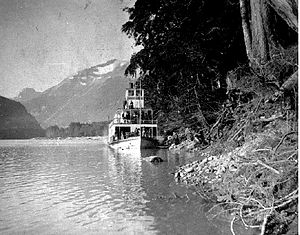- Monte Cristo (sternwheeler)
-

Monte Cristo on the Skeena River.Career Name: Monte Cristo Route: Puget Sound, Snohomish, Stikine, and Skeena rivers Builder: John J. Holland Completed: 1891 Out of service: 1903 or 1922 Identification: US reg #92382 / Canadian reg. #107824 Fate: Abandoned. General characteristics Tonnage: 187.77 gross / 128.08 reg. (as built); 266 gross / 155 reg. (as reconstructed). Length: 90.2 ft (27.5 m) (as built); 108.6 ft (33.1 m) (as reconstructed) Beam: 24.1 ft (7.3 m) (as built); 120.4 ft (36.7 m) (as reconstructed) Depth: 3 ft (0.9 m) (as built); 3.9 ft (1.2 m) (as reconstructed) Installed power: twin steam engines, horizontal mounted, 10 inch bore by 48 inch stroke, 10 net horsepower Propulsion: sternwheel Monte Cristo was a sternwheel steamboat which was operated in Puget Sound and the coastal rivers of the state of Washington and the province of British Columbia.
Contents
Career
The sources are in some conflict as to the early career of this vessel. According to one source, Monte Cristo was built in 1891 in Everett, Washington.[1] According to another source, Monte Cristo was built in Ballard, Washington by John J. Holland, with engines provided by the Moran Brothers.[2]
The vessel's first owner was Henry Carstens, who had been a purser for the Oregon Railway and Navigation Company. He intended to use the boat on the Snohomish River. The vessel was 90 feet long. In 1893, Carstens sold Monte Cristo to Ernest Shellgren, who owned a store in Longbranch, Washington where he was also the postmaster. Shellgren sold the vessel in 1896.[1]
In 1898, Monte Cristo was sold to interests who took the vessel to Alaska for use on the Stikine River, which then thought to be an alternative “All-Canadian” route to the Klondike gold rush. Monte Cristo was the second vessel to ascent the Stikine River in the 1898 season. The vessel was reregistered in Canada and rebuilt to be longer, narrower, and heavier.[2]
In 1900, Monte Cristo was transferred to the Skeena River in British Columbia under the ownership of the firm of R. Cunningham and Son, of Port Essington, BC, who were mounting a challenge to the domination of the Hudsons Bay Company on the Skeena River trade. Monte Cristo was later chartered by the Dominion government to be used again on the Stikine River for the construction of a telegraph line to the Yukon.[2]
'One source says Monte Cristo was abandoned in 1903,[2] another gives the year as 1922.[1]
See also
- Robert Cunningham (entrepreneur)
- Steamboats of the Skeena River
- Steamboats of the Stikine River
- Puget Sound Mosquito Fleet
Notes
References
- Affleck, Edwin L, ed. A Century of Paddlewheelers in the Pacific Northwest, the Yukon, and Alaska, Alexander Nicholls Press, Vancouver, BC (2000) ISBN 0-920034-08-X
- Downs, Art, Paddlewheels on the Frontier: The Story of British Columbia and Yukon Sternwheel Steamers, Superior Publishing, Seattle, WA (1972) ISBN 0-8882-6033-4
- Findlay, Jean Cammon and Paterson, Robin, Mosquito Fleet of Southern Puget Sound, (2008) Arcadia Publishing ISBN 0-7385-5607-6
- Turner, Robert D., Sternwheelers and Steam Tugs – An Illustrated History of the Canadian Pacific Railway's British Columbia Lake and River Service, Sono Nis Press, Victoria, BC 1984 ISBN 0-919203-15-9
Steamboats of the Skeena River Steamboats and tugs Steamboat lines Owners, captains, and personnel - John Bonser
- Tom Coffin
- William Moore
- Robert Cunningham
- Charles Melville Hays
related topic : Puget Sound Mosquito FleetSteamboats of Puget Sound and western Washington State Propellers Wood- Albion
- Alice (1897)
- Alice Gertrude
- Annie M. Pence
- Aquilo
- Atlanta
- Audrey
- Bay Island
- Bellingham
- Burton
- C.C. Calkins
- C.C. Cherry
- Calista
- Camano
- Clallam
- Concordia
- Crest
- Crystal
- Daring
- Dart
- Dauntless
- Defiance
- Dix
- Dode
- Dove
- Eagle
- Elfin
- Elk
- Elsinore
- Fleetwood
- Florence K
- Fortuna
- Flyer
- General Miles
- Hattie Hansen
- Hector
- Hyak
- Inland Flyer
- Iola
- Island Princess
- Islander
- Katherine
- L.T. Haas
- Lady of the Lake
- Magnolia
- Mizpah
- Monticello 2
- Otter
- Quickstep
- Rosalie
- Sentinel
- Triton
- Urania
- Vashon
- Verona
- Victor
- Virginia V
- Willapa
SteelSternwheelers Sidewheelers Steam tugs Steam ferries ConvertedPurpose-builtMotor vessels TowingPacific Tow Boat Co.Ferry- Kitsap County Trans. Co.
- Oreg. & Wash. Ferry & Nav. Go.
- Puget Sound Nav. Co.
- West Seattle Land & Improv. Co.
Shipyards - Crawford & Reid
- J.F. Duthie
- Holland
- King & Winge
- Lake Washington
- Moran Bros.
- Martinolich
Personnel - William Ballard
- Thomas Coupe
- Joshua Green
- Matthew McDowell
OregonBritish Columbia- Upper Fraser River
- Lakes Route
- Arrow Lakes
- Okanagan Lake
- Upper Columbia and Kootenay Rivers
- Skeena River
- Stikine River
- Peace River
Alaska and YukonOtherNavboxes - Columbia River
- British Columbia
- California
Lists of vessels related topic: Washington State Ferries - 1891 ships
- Steamboats of Washington (state)
- Passenger ships of the United States
- Passenger ships of Canada
- Paddle steamers
- Paddle steamers of British Columbia
- Ships built in Washington (state)
- Steamboats of the Stikine River
- Steamboats of the Skeena River
Wikimedia Foundation. 2010.
